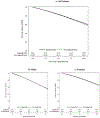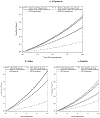Alzheimer's Dementia After Exposure to Anesthesia and Surgery in the Elderly: A Matched Natural Experiment Using Appendicitis
- PMID: 33214467
- PMCID: PMC8437105
- DOI: 10.1097/SLA.0000000000004632
Alzheimer's Dementia After Exposure to Anesthesia and Surgery in the Elderly: A Matched Natural Experiment Using Appendicitis
Abstract
Objective: The aim of this study was to determine whether surgery and anesthesia in the elderly may promote Alzheimer disease and related dementias (ADRD).
Background: There is a substantial conflicting literature concerning the hypothesis that surgery and anesthesia promotes ADRD. Much of the literature is confounded by indications for surgery or has small sample size. This study examines elderly patients with appendicitis, a common condition that strikes mostly at random after controlling for some known associations.
Methods: A matched natural experiment of patients undergoing appendectomy for appendicitis versus control patients without appendicitis using Medicare data from 2002 to 2017, examining 54,996 patients without previous diagnoses of ADRD, cognitive impairment, or neurological degeneration, who developed appendicitis between ages 68 through 77 years and underwent an appendectomy (the ''Appendectomy'' treated group), matching them 5:1 to 274,980 controls, examining the subsequent hazard for developing ADRD.
Results: The hazard ratio (HR) for developing ADRD or death was lower in the Appendectomy group than controls: HR = 0.96 [95% confidence interval (CI) 0.94-0.98], P < 0.0001, (28.2% in Appendectomy vs 29.1% in controls, at 7.5 years). The HR for death was 0.97 (95% CI 0.95-0.99), P = 0.002, (22.7% vs 23.1% at 7.5 years). The HR for developing ADRD alone was 0.89 (95% CI 0.86-0.92), P < 0.0001, (7.6% in Appendectomy vs 8.6% in controls, at 7.5 years). No subgroup analyses found significantly elevated rates of ADRD in the Appendectomy group.
Conclusion: In this natural experiment involving 329,976 elderly patients, exposure to appendectomy surgery and anesthesia did not increase the subsequent rate of ADRD.
Copyright © 2020 Wolters Kluwer Health, Inc. All rights reserved.
Conflict of interest statement
The authors report no conflicts of interest .
Figures


References
-
- Xie Z, Dong Y, Maeda U, et al. The common inhalation anesthetic isoflurane induces apoptosis and increases amyloid beta protein levels. Anesthesiology. 2006;104:988–994. - PubMed
-
- Eckenhoff RG, Johansson JS, Wei H, et al. Inhaled anesthetic enhancement of amyloid beta oligomerization and cytotoxicity. Anesthesiology. 2004;101:703–709. - PubMed
-
- Perucho J, Rubio I, Casarejos MJ, et al. Anesthesia with isoflurane increases amyloid pathology in mice models of Alzheimer's disease. J Alzheimers Dis. 2010;19:1245–1257. - PubMed
Publication types
MeSH terms
Grants and funding
LinkOut - more resources
Full Text Sources
Medical

